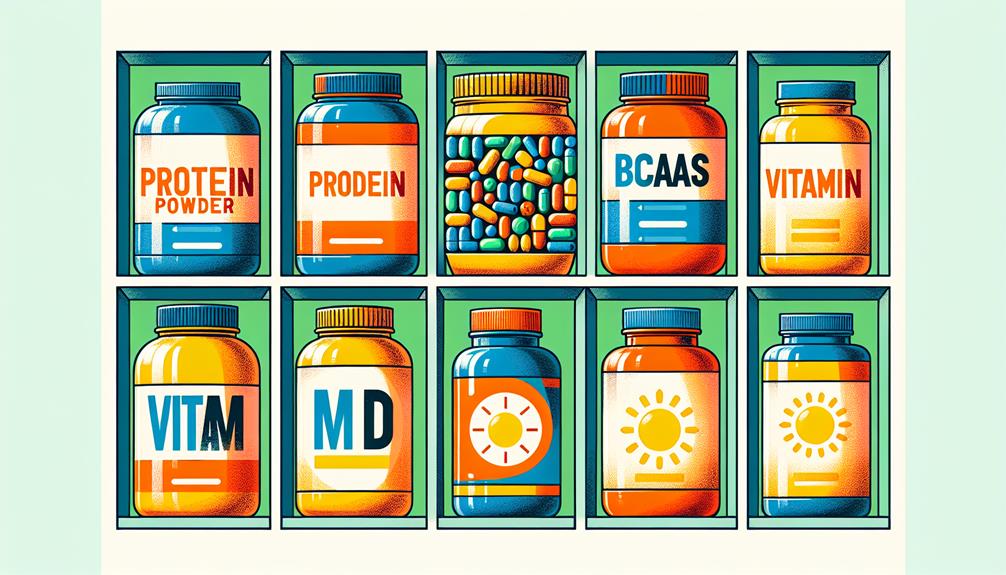So, you're an athlete striving for peak performance? Well, let's talk about the 5 best vitamin and mineral supplements that could take your game to the next level.
From boosting energy with B Vitamins to enhancing muscle strength with Creatine, these supplements pack a powerful punch.
But what about the lesser-known ones like Beta-Alanine and Electrolytes? Curious to uncover how these could be your secret weapons in the world of sports nutrition?
Key Takeaways
- Creatine enhances muscle mass and power for improved athletic performance.
- Vitamin D supports muscle function, strength, and recovery in athletes.
- Electrolytes are crucial for hydration and optimal muscle function.
- Iron is vital for metabolism, energy, and preventing fatigue in athletes.
Creatine
Have you ever wondered how creatine supplementation can enhance your athletic performance? Creatine is a widely used supplement among athletes looking to improve muscle mass and power. Its effects are particularly notable in enhancing performance during short bursts of high-intensity exercise. For optimal results, athletes typically consume between 3 to 7 grams of creatine per day. However, it's essential to note that not everyone responds to creatine in the same way, with a portion of the population not experiencing its benefits.
When considering creatine supplementation, athletes involved in sports with weight management components should be cautious. The increase in muscle mass from creatine intake may impact weight management strategies, especially for those in weight-class sports. Therefore, it's crucial to evaluate how creatine supplementation aligns with individual athletic goals and weight requirements.
Beta-Alanine
Wondering how beta-alanine can boost your exercise capacity and performance in short-duration activities? Beta-alanine, a popular supplement among athletes, enhances exercise capacity by increasing anaerobic glycolysis utilization. This mechanism is especially beneficial for individuals engaging in high-intensity exercises. To experience the performance-enhancing effects, a daily intake of around 5 grams of beta-alanine is recommended.
While incorporating beta-alanine into your supplement regimen, be prepared for a potential tingling sensation, known as paresthesia, which may occur, particularly at higher doses. This sensation is a common side effect but is harmless. By including beta-alanine in your routine, you can push through fatigue more effectively, improve your muscle firing rate, and reduce muscle soreness post-exercise. These benefits make beta-alanine a valuable addition to the toolkit of athletes looking to enhance their performance in short bursts of intense physical activity.
Vitamin D

To optimize your athletic performance and support muscle function, strength, and power, consider the crucial role vitamin D plays in your overall health and fitness regimen. Vitamin D is essential for athletes as it's linked to improved muscle size, strength, and recovery. Deficiencies in vitamin D are common among athletes and can negatively impact athletic performance.
Adequate levels of vitamin D aren't only beneficial for muscle function but also play a critical role in immune health, testosterone levels, and reducing the risk of injuries. Supplementing with vitamin D at recommended doses of 1000-2000 IU per day can help you maintain optimal performance levels.
Ensuring you have sufficient vitamin D levels can contribute to better overall athletic performance, so make it a priority to monitor and, if necessary, supplement your vitamin D intake to support your fitness goals.
Iron
Iron plays a critical role in optimizing athletic performance by supporting overall metabolism and oxygen transport. Adequate iron intake is essential for maintaining optimal muscle function and ensuring athletes can perform at their best. Deficiencies in iron can lead to fatigue and decreased performance, with menstruating female athletes being particularly vulnerable to such issues.
Iron helps prevent iron-deficiency anemia, which can significantly impact an athlete's energy levels and endurance. It's crucial for athletes, especially menstruating females, to monitor their iron levels to prevent deficiencies and support their athletic performance.
Electrolytes

Ensuring proper electrolyte balance is crucial for athletes to maintain hydration and support muscle function during exercise. Electrolytes such as sodium, potassium, calcium, and magnesium play a vital role in preventing dehydration and optimizing athletic performance. These minerals are lost through sweat during physical activity, making it essential to replenish them to avoid muscle cramps, fatigue, and decreased performance.
Sodium helps regulate fluid balance, potassium aids in muscle function, calcium supports muscle contractions, and magnesium is crucial for energy production. Imbalances in these electrolytes can hinder athletic performance, emphasizing the importance of monitoring levels and replenishing them as needed. Athletes engaging in intense or prolonged exercise may benefit from electrolyte supplements to maintain optimal performance and prevent dehydration.
Frequently Asked Questions
What Vitamins and Minerals Should Athletes Take?
For peak performance, athletes should consider taking a variety of supplements to support energy, metabolism, bone health, muscle function, immunity, and injury prevention. Proper nutrition is key to optimizing your athletic abilities.
What Vitamin or Mineral Supplement Improve Athletic Performance?
To improve athletic performance, consider Vitamin D for muscle strength, Iron for energy, Beetroot juice for efficiency, Beta-alanine for endurance, and Creatine for power. These supplements can boost your abilities and help you excel in sports.
What Is the Best Multivitamin for Athletes?
For athletes, choose a multivitamin packed with essential nutrients like B vitamins for energy and minerals such as iron for optimal performance. Ensure it includes vitamins D and calcium for bone health and muscle function, and vitamin E for cell repair.
Which Supplement Is Best for Sports Person?
When considering which supplement is best for sports, it's essential to focus on your specific needs and goals. Consult with a healthcare provider or sports nutritionist to determine the most suitable options for you.
Conclusion
In conclusion, incorporating the right vitamins and mineral supplements into your regimen can greatly benefit athletes by supporting energy levels, performance, and recovery.
From Creatine to Vitamin D, these supplements play a key role in enhancing muscle strength, preventing fatigue, and promoting overall health.
Consult with a healthcare provider to determine the best options for your specific needs and goals, and enjoy the benefits of optimized performance and well-being.
I’m not just a supplement analyst. I’m an extremely qualified one! I am a Certified Nutrition Coach (CNC) and actually received my certification directly from the National Academy of Sports Medicine. I am also a Nutrition & Wellness Consultant, certified by the American Fitness Professionals Association (AFPA).


